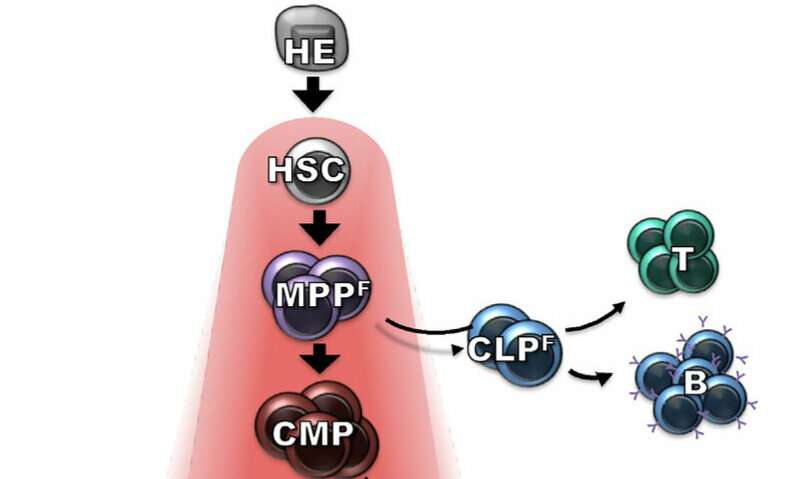Study gives new perspective on production of blood cells and immune cells

A healthy adult makes about 2 million blood cells every second, and 99 percent of them are oxygen-carrying red blood cells. The other one percent are platelets and the various white blood cells of the immune system. How all the different kinds of mature blood cells are derived from the same "hematopoietic" stem cells in the bone marrow has been the subject of intense research, but most studies have focused on the one percent, the immune cells.
"It's a bit odd, but because red blood cells are enucleated and therefore hard to track by genetic markers, their production has been more or less ignored by the vast number of studies in the past couple of decades," said Camilla Forsberg, professor of biomolecular engineering in the Baskin School of Engineering at UC Santa Cruz.
In a new study, published March 21 in Stem Cell Reports, Forsberg's lab overcame technical obstacles to provide a thorough accounting of blood cell production from hematopoietic stem cells. Their findings are important for understanding disorders such as anemia, diseases of the immune system, and blood cancers such as leukemias and lymphomas.
"We're trying to understand the balance of production of blood cells and immune cells, which goes wrong in many kinds of disorders," Forsberg said.
The process by which hematopoietic stem cells give rise to mature blood cells involves multiple populations of progenitor cells that become progressively more committed to a specific "fate" as they develop into fully mature cells. A major fork in the road is between "lymphoid progenitors," which give rise to white blood cells called lymphocytes, and "myeloid progenitors," which give rise to other kinds of white blood cells, as well as red blood cells and platelets. The majority of cells in the bone marrow are in the myeloid lineage.
A key finding of the new study is that all progenitor cells with myeloid potential produce far more red blood cells than any other cell type. This was surprising because many previous studies in which progenitor cells were grown in cell cultures ("in vitro") found they had limited capacity to produce red blood cells and platelets. Forsberg said those results now appear to be an artifact of the culture conditions.
"It's been hard to make sense of a lot of those experiments, because we know our bodies need to make a lot of red blood cells and platelets," she said. "Our results show that these progenitor cells retain a lot of red blood cell potential. In fact, we propose that red blood cell production is the default pathway."
In experiments led by first author Scott Boyer, a graduate student in Forsberg's lab, researchers transplanted different progenitor cell populations into mice and tracked the production of red blood cells as well as platelets (the second largest component of blood) and immune cells. Boyer was also able to transplant single progenitor cells and then identify the blood and immune cells it produced.
By quantifying the numbers of mature blood cells produced from transplanted progenitors, the researchers were able to show that red blood cells were by far the most abundant cell type produced by every type of progenitor cell, with the exception of lymphoid progenitors. Their findings led to the development of a model of hematopoietic differentiation that focuses on red blood cells as the default pathway for all myeloid progenitors.
More information: Scott W. Boyer et al, Clonal and Quantitative In Vivo Assessment of Hematopoietic Stem Cell Differentiation Reveals Strong Erythroid Potential of Multipotent Cells, Stem Cell Reports (2019). DOI: 10.1016/j.stemcr.2019.02.007




















